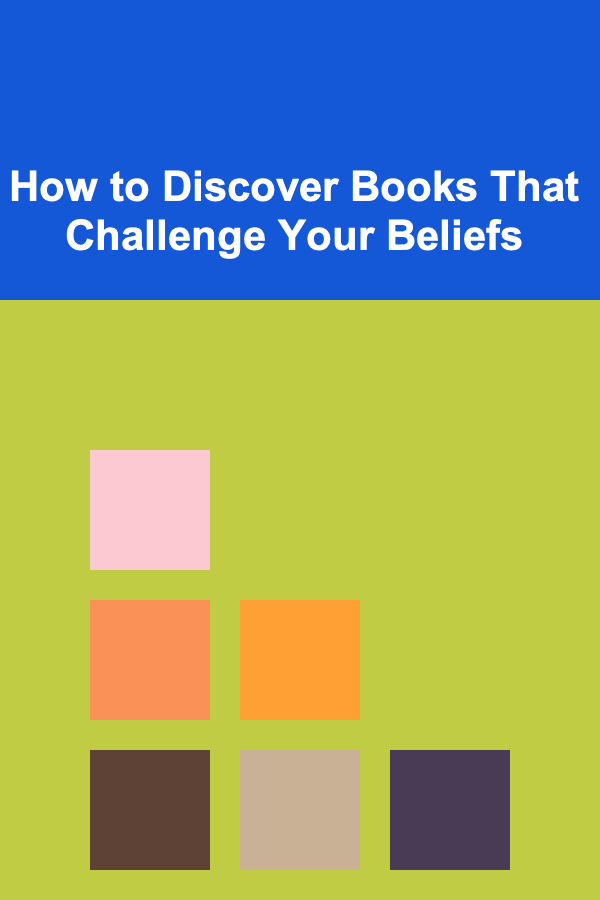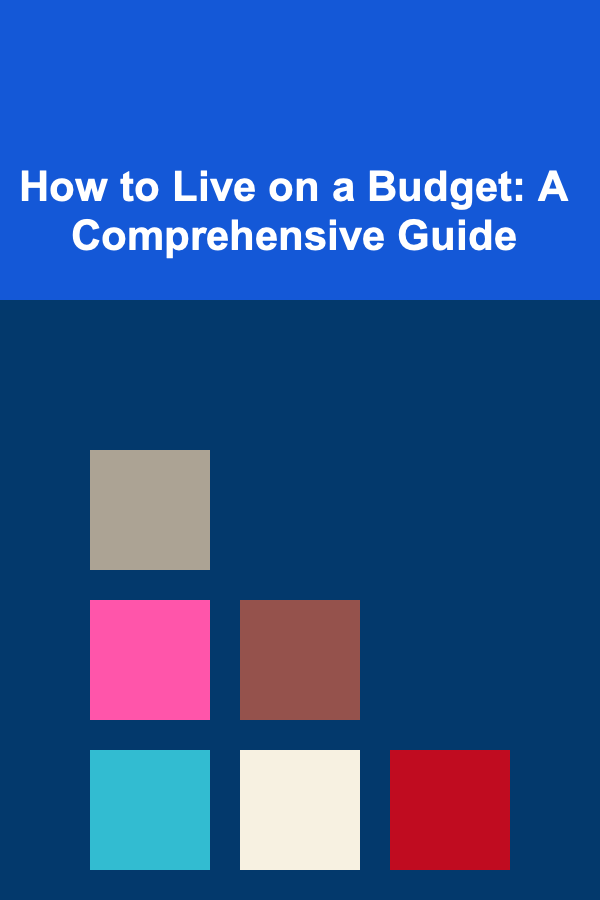
How to Discover Books That Challenge Your Beliefs
ebook include PDF & Audio bundle (Micro Guide)
$12.99$7.99
Limited Time Offer! Order within the next:

Books have always held the power to shape, shift, and sometimes even radically challenge our thoughts, beliefs, and understanding of the world around us. In an age where information is easily accessible and ideas spread through social media and the internet, it is more important than ever to engage with literature that forces us to reconsider our assumptions and biases. Discovering books that challenge your beliefs can lead to personal growth, deeper empathy, and a more well-rounded worldview. But how do you go about finding these books? And once you do, how do you approach them in a way that allows for meaningful reflection and growth?
In this article, we will explore practical methods to find books that can challenge your beliefs, the types of books that are most likely to do so, and strategies for reading them in a way that encourages critical thinking and self-awareness.
Understanding the Importance of Challenging Your Beliefs
Before we dive into the methods of discovering challenging books, it is crucial to understand why such books are important in the first place.
The Limits of Echo Chambers
In today's digital world, people often find themselves in echo chambers---social spaces where their existing views are reinforced and rarely questioned. While it is comfortable to surround yourself with people, media, and books that align with your beliefs, this can lead to intellectual stagnation. The problem with echo chambers is that they limit exposure to diverse perspectives, making it harder to grow, challenge one's assumptions, and consider alternative viewpoints.
Broadening Perspectives
Books that challenge your beliefs force you to step outside your comfort zone and reconsider long-held notions. They open your mind to new ideas, provide alternative viewpoints, and may even make you question your most foundational assumptions about life, politics, religion, or society. Engaging with these books fosters critical thinking, empathy, and intellectual humility. It encourages you to see the world not just through your own lens, but through the eyes of others who have different experiences and perspectives.
Building Resilience in Beliefs
Challenging your beliefs doesn't necessarily mean abandoning them. In fact, reading books that push against your beliefs can make them stronger. It gives you the opportunity to examine your views in greater detail, assess the validity of your arguments, and refine your beliefs. If you are truly convinced that your viewpoint is correct, engaging with opposing ideas will help you to better articulate and defend your stance. If your beliefs are flawed or based on incorrect assumptions, these books offer an opportunity to grow and adapt.
Identify Your Belief System
Before you begin searching for books that challenge your beliefs, it is important to first examine your current belief system. Understanding what you believe and why you believe it will help you identify areas where you may be most vulnerable to intellectual growth.
Reflect on Your Core Beliefs
Take some time to reflect on the beliefs that guide your life. These may include religious beliefs, political ideologies, cultural norms, or philosophical views. Ask yourself:
- What are the core beliefs that shape my worldview?
- Why do I hold these beliefs?
- What evidence or experiences support my beliefs?
- Are there any beliefs I hold that are based on tradition or societal pressures rather than my own careful reasoning?
This reflection will give you a clearer sense of your belief system and help you pinpoint areas where you might want to challenge yourself.
Recognize Cognitive Biases
Humans are prone to cognitive biases that influence how we perceive and evaluate information. For instance, confirmation bias leads us to seek out information that supports our existing beliefs, while ignoring evidence that contradicts them. Being aware of these biases is an important step in finding books that challenge your beliefs. Recognize that you may naturally gravitate toward books that align with your current viewpoints, so make a conscious effort to seek out diverse perspectives.
Methods for Discovering Challenging Books
Now that you have a clearer understanding of your own belief system, it's time to start searching for books that will challenge your beliefs. The process involves being intentional in your approach and seeking out works that are thought-provoking, controversial, and outside your normal range of comfort.
1. Read Outside Your Comfort Zone
One of the most effective ways to find books that challenge your beliefs is to step outside your normal reading habits. If you predominantly read books that support your worldview, consider diversifying your reading list. Seek books from genres or topics you don't usually engage with.
- Explore Different Genres: If you mostly read fiction, try non-fiction books that delve into history, philosophy, science, or sociology. If you're accustomed to reading personal development books, explore literature on political theory or social justice.
- Read from Diverse Authors: Seek books written by authors who have different cultural backgrounds, experiences, and ideologies. This could include works from authors of various nationalities, ethnicities, genders, or political affiliations.
- Engage with Controversial Topics: Delve into subjects that are often the subject of heated debate. For example, books on topics like climate change, artificial intelligence, human rights, or economic inequality often present diverse viewpoints that can challenge your understanding of the world.
2. Explore Opposing Perspectives
If you have strongly held beliefs, look for books that present the opposite viewpoint. For example, if you are politically conservative, read books by liberal thinkers, and vice versa. If you have religious convictions, explore books written by atheists or people from other faith traditions. These books may force you to reconsider your positions and understand why others hold different views.
Some examples include:
- Political Views: Reading books by authors with opposing political leanings, such as conservative works for liberals or liberal works for conservatives.
- Philosophical Views: If you are a utilitarian, read about deontological ethics or vice versa.
- Religious Views: If you are a devout believer, explore works from atheists or secular thinkers who offer critiques of religious beliefs.
3. Join Book Groups or Online Communities
Engaging with book clubs or online communities is another effective way to discover books that challenge your beliefs. Groups with diverse membership can offer recommendations that you might not have considered on your own. These communities also provide opportunities to discuss books and engage in debates, further deepening your understanding of the material and its implications.
4. Read Reviews and Summaries
Before committing to a book, read reviews or summaries to get a sense of its content. This can help you identify works that challenge your perspective. Many websites and platforms, such as Goodreads, offer user-generated reviews that can give insight into the themes of a book and whether it presents a challenge to your beliefs. You can also check out book recommendations from thought leaders, academics, or journalists who encourage intellectual growth and exploration.
5. Look for Books with a Strong Critical Voice
Books that challenge your beliefs often have a strong critical voice, offering analysis, critique, and alternative perspectives. Look for works that are known for their intellectual rigor, thought-provoking arguments, and counterintuitive ideas. These books often push boundaries and question mainstream narratives, making them ideal for readers seeking to expand their horizons.
Approaching the Challenging Books
Once you have found books that challenge your beliefs, the next step is to approach them thoughtfully and with an open mind. Reading a book that contradicts your views can be uncomfortable, but it is this discomfort that often leads to growth.
1. Maintain Intellectual Humility
When reading a book that challenges your beliefs, approach it with intellectual humility. Recognize that your current understanding of the world is not absolute, and be open to the possibility that the author may have valid points that you haven't considered. This doesn't mean you have to agree with everything in the book, but it does mean being willing to listen and engage with the material.
2. Read Critically
While it is important to approach the book with an open mind, it is also essential to read critically. Don't passively accept everything the author says. Consider the evidence and arguments presented, and assess whether they are well-supported and logically sound. Take notes, highlight passages, and reflect on how the material aligns or conflicts with your beliefs. This active engagement will deepen your understanding of both the book and your own viewpoint.
3. Discuss the Book with Others
After reading the book, engage in discussions with others who have read it or who hold different perspectives. These conversations can help you further process the material and refine your views. Engage in respectful debates and ask questions that challenge your understanding. By discussing the book, you may gain new insights or come to a better understanding of why you hold the beliefs you do.
4. Reflect on Your Own Beliefs
Finally, take time to reflect on your own beliefs in light of the book you've read. Do the new ideas make you reconsider your position, or do they strengthen your existing beliefs? Perhaps the book has not changed your perspective, but it has deepened your understanding of the issue. Either way, challenging books encourage self-reflection and growth, allowing you to develop a more nuanced and informed worldview.
Conclusion
Discovering books that challenge your beliefs is an essential part of intellectual growth. It broadens your understanding of the world, deepens your empathy for others, and encourages critical thinking. By intentionally seeking out books from diverse perspectives and engaging with them critically, you can develop a more complex and well-rounded worldview. Remember that challenging your beliefs doesn't mean abandoning them, but rather testing their foundations and refining them in light of new information. Embrace the discomfort of intellectual challenge---it is through this discomfort that true growth occurs.

How to Perform Routine Checks on Your Home's Electrical Panel
Read More
How to Use Multi-Purpose Furniture for Hidden Storage
Read More
How To Manage Your Calendar Like a Remote Pro
Read More
How to Install a New Shower Curtain Rod: A Comprehensive Guide
Read More
How to Choose the Right Post-Workout Meal
Read More
How to Live on a Budget: A Comprehensive Guide
Read MoreOther Products

How to Perform Routine Checks on Your Home's Electrical Panel
Read More
How to Use Multi-Purpose Furniture for Hidden Storage
Read More
How To Manage Your Calendar Like a Remote Pro
Read More
How to Install a New Shower Curtain Rod: A Comprehensive Guide
Read More
How to Choose the Right Post-Workout Meal
Read More